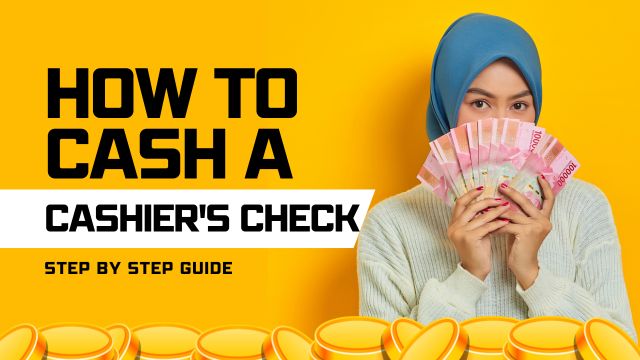

Cashier’s checks are often used for large transactions or when a guarantee of payment is necessary. They are considered more secure than personal checks because the funds are drawn directly from the bank’s account, making them a trusted form of payment. However, many people are unsure of the process involved in cashing a cashier’s check. This guide will walk you through the steps to cash a cashier’s check, highlight where you can do so, and offer tips to ensure a smooth transaction. Understanding these steps can save you time and avoid potential pitfalls, ensuring you receive your funds quickly and securely.
Table of contents
What is a Cashier’s Check?
A cashier’s check is a type of check that is guaranteed by the bank that issues it. Unlike a personal check, which is written by an individual and drawn from their personal account, a cashier’s check is drawn from the bank’s own funds. This makes cashier’s checks more secure and less prone to bouncing due to insufficient funds.
Cashier’s checks are commonly used for large transactions, such as purchasing a car, making a down payment on a house, or paying for other significant expenses. They offer a high level of security for both the payer and the payee, as the funds are guaranteed by the bank.
Key features of a cashier’s check include:
- The bank’s name and address
- The amount of the check
- The recipient’s name
- A unique check number
- A bank officer’s signature
Understanding these elements is crucial for verifying the authenticity of a cashier’s check and ensuring a smooth cashing process.
Steps to Cash a Cashier’s Check
1. Verify the Check
- Check for Authenticity: Examine the cashier’s check for any signs of tampering or forgery. Look for watermarks, the issuing bank’s logo, and other security features.
- Verify with the Issuing Bank: If you have any doubts about the check’s authenticity, contact the issuing bank directly to confirm that the check is legitimate and funds are available.
2. Endorse the Check
- Proper Endorsement Procedures: Turn the check over and sign your name on the endorsement line at the back. Ensure your signature matches the name on the front of the check.
- Importance of Signing the Check: Proper endorsement is essential for cashing the check. Without your signature, the bank or check-cashing service cannot process the transaction.
3. Choose a Cashing Location
- Banks and Credit Unions:
- Pros: Typically offer lower fees, especially for account holders. Can deposit funds directly into your account.
- Cons: Non-account holders may face higher fees or be unable to cash the check.
- Check-Cashing Stores:
- Fees and Considerations: These stores provide immediate cash but often charge higher fees. Useful if you do not have a bank account.
- Retailers and Grocery Stores:
- Availability and Limitations: Some large retailers and grocery stores offer check-cashing services, often at lower fees. However, they may have limits on the amount they can cash.
4. Provide Identification
- Types of Acceptable IDs: Commonly accepted forms of ID include a driver’s license, passport, or state-issued ID. Some places may also accept military IDs or other government-issued identification.
- Why Identification is Necessary: To prevent fraud and ensure that the person cashing the check is the rightful payee, identification is required.
5. Complete the Transaction
- What to Expect During the Process: Present your endorsed check and identification to the teller or cashier. They will verify your information and process the check.
- Handling Cash or Deposit: Decide if you want to receive cash immediately or have the funds deposited into your account. Be aware of any fees associated with cashing the check and factor this into your decision.
Where to Cash a Cashier’s Check?
1. Banks and Credit Unions
- Process and Requirements: Most banks and credit unions will cash a cashier’s check for you, especially if you have an account with them. You will need to present your endorsed check and a valid form of identification.
- Potential Fees for Non-Customers: If you are not an account holder, the bank may charge a fee for cashing the check, or they may decline to cash it altogether. It’s advisable to call ahead and ask about their policy for non-customers.
2. Check-Cashing Stores
- Overview of Check-Cashing Services: These stores specialize in cashing various types of checks, including cashier’s checks. They provide immediate cash but typically charge a higher fee than banks.
- Typical Fees and Charges: Fees at check-cashing stores can vary but are generally a percentage of the check amount or a flat fee. It’s important to ask about the fee structure before cashing your check to avoid unexpected charges.
3. Retailers and Grocery Stores
- List of Common Retailers that Cash Checks: Some major retailers, like Walmart and certain grocery store chains, offer check-cashing services. They can be convenient locations if you do not have a nearby bank.
- Fees and Limitations: Retailers and grocery stores often have lower fees than check-cashing stores, but they may have limits on the amount they can cash. It’s best to check with the store ahead of time to ensure they can cash your check and to inquire about any applicable fees.
Understanding the different locations where you can cash a cashier’s check and the associated fees will help you choose the best option for your needs. Each option has its own advantages and disadvantages, so consider these factors when deciding where to cash your check.
Fees and Considerations
Comparison of Fees Across Different Cashing Options
- Banks and Credit Unions: Fees for cashing a cashier’s check at your own bank or credit union are typically low or nonexistent. However, non-account holders may face higher fees, which can range from a few dollars to a percentage of the check amount.
- Check-Cashing Stores: These stores usually charge higher fees, which can be a percentage of the check amount (e.g., 1-5%) or a flat fee. It’s important to inquire about the fee structure before proceeding.
- Retailers and Grocery Stores: Fees at these locations are generally lower than check-cashing stores but can vary. Some may charge a flat fee (e.g., $3-$6), while others may have a fee structure based on the check amount.
Factors to Consider When Choosing Where to Cash Your Check
- Convenience: Consider the location’s proximity to you and its operating hours. Banks may have limited hours compared to retailers and check-cashing stores.
- Fees: Evaluate the fees charged by different locations. While check-cashing stores may be more convenient, their higher fees can add up, especially for large checks.
- Processing Time: Some banks may place a hold on the funds, especially if you are not a customer, which can delay access to your money. Check-cashing stores and retailers typically provide immediate cash.
- Safety: If you’re cashing a large check, consider the safety of the location. Banks are generally secure, while check-cashing stores and some retail locations might pose higher risks for carrying large amounts of cash.
Understanding these fees and considerations will help you make an informed decision about where to cash your cashier’s check, ensuring you receive your funds efficiently and securely.
Tips for Cashing a Cashier’s Check
- Ensuring the Check is Legitimate
- Check for Security Features: Verify the presence of watermarks, bank logos, and other security features on the check.
- Contact the Issuing Bank: If in doubt, call the bank that issued the check to confirm its authenticity and availability of funds.
- Preparing Necessary Documentation
- Identification: Bring a valid ID such as a driver’s license, passport, or state-issued ID.
- Secondary Forms of ID: Some places may require additional identification, such as a credit card or utility bill with your name and address.
- Avoiding Common Pitfalls and Scams
- Be Cautious with Unknown Senders: If you receive a cashier’s check from someone you don’t know, be wary. Scammers often use fake checks in fraud schemes.
- Verify Funds Before Spending: Ensure that the check has cleared and the funds are available before using the money. Banks can sometimes take days to verify a check, during which time it could be discovered as fraudulent.
- Timing and Strategy
- Cash During Bank Hours: If possible, cash your check during bank hours for added security and assistance if needed.
- Consider Depositing Instead: If you have a bank account, consider depositing the check instead of cashing it to avoid carrying large amounts of cash.
By following these tips, you can minimize risks and ensure a smooth process when cashing your cashier’s check. Staying vigilant and prepared can help you avoid common issues and scams, ensuring you receive your funds safely and promptly.
Conclusion
Cashing a cashier’s check can seem daunting, but by following the steps outlined in this guide, you can ensure a smooth and secure transaction. Here are the key points to remember:
- Understand the Nature of a Cashier’s Check: Recognize the security features and benefits that make cashier’s checks a trusted form of payment.
- Follow Proper Procedures: Verify the check’s authenticity, endorse it correctly, and choose a suitable location for cashing.
- Know Your Options: Banks, credit unions, check-cashing stores, and retailers each have their own processes, fees, and considerations. Select the one that best fits your needs.
- Prepare and Be Aware: Bring the necessary identification, understand potential fees, and stay cautious to avoid scams and pitfalls.
By being prepared and informed, you can efficiently manage the process of cashing a cashier’s check, ensuring you receive your funds quickly and securely.
Additional Resources
- Contact Information for Major Banks:
- Bank of America: Customer Service: 1-800-432-1000
- Chase Bank: Customer Service: 1-800-935-9935
- Wells Fargo: Customer Service: 1-800-869-3557
- Check-Cashing Services:
- Walmart Money Center: Check Cashing Services
- Ace Cash Express: Check Cashing Services
- Western Union: Check Cashing Locations
By utilizing these resources, you can further educate yourself on the process and find the best options for cashing your cashier’s check.
Frequently Asked Questions on How to Cash a Cashier’s Check
1. What is a cashier’s check?
A cashier’s check is a secure form of payment issued by a bank, guaranteed by the bank’s own funds. It is often used for large transactions and provides assurance to the recipient that the funds are available.
2. Where can I cash a cashier’s check?
You can cash a cashier’s check at banks and credit unions, check-cashing stores, and certain retailers and grocery stores. Each option may have different fees and requirements.
3. Do I need identification to cash a cashier’s check?
Yes, you will need to provide valid identification, such as a driver’s license, passport, or state-issued ID. Some locations may require a secondary form of ID as well.
4. Are there fees for cashing a cashier’s check?
Fees vary depending on where you cash the check. Banks and credit unions may offer lower fees, especially for account holders, while check-cashing stores and retailers might charge higher fees.
5. Can I cash a cashier’s check if I don’t have a bank account?
Yes, you can cash a cashier’s check at check-cashing stores and certain retailers without a bank account. However, these locations may charge higher fees compared to banks.
6. How can I verify if a cashier’s check is legitimate?
To verify a cashier’s check, look for security features like watermarks and the bank’s logo. You can also contact the issuing bank directly to confirm the check’s authenticity and the availability of funds.
7. Can I deposit a cashier’s check instead of cashing it?
Yes, you can deposit a cashier’s check into your bank account. This may be a safer option than carrying large amounts of cash.
8. How long does it take for a cashier’s check to clear?
While cashier’s checks are generally considered secure, banks may place a hold on the funds, especially for non-account holders. The hold period can range from a few days to over a week.
9. What should I do if I lose a cashier’s check?
If you lose a cashier’s check, contact the issuing bank immediately. You may need to provide proof of purchase and file a declaration of loss. The bank may issue a replacement check, but this process can take time.
10. Can a cashier’s check be canceled or stopped?
Stopping payment on a cashier’s check is difficult because it is guaranteed by the bank. If you need to cancel a cashier’s check, contact the issuing bank as soon as possible for their specific procedures.
11. Are cashier’s checks safe from fraud?
While cashier’s checks are more secure than personal checks, they are not immune to fraud. Always verify the check’s authenticity with the issuing bank, especially if you receive it from an unknown party.
12. What information do I need to cash a cashier’s check?
You will need the endorsed cashier’s check and a valid form of identification. Some locations may require additional identification or documentation.
These FAQs cover the most common questions about cashing a cashier’s check, providing clarity and guidance for a smooth and secure transaction.



